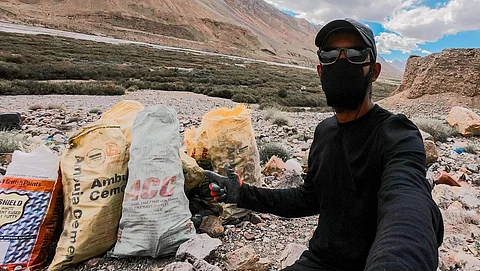

Walk down the flight of steps that lead you to River Ganga near Rishikesh's Lakshman Jhula and chances are that you will stumble upon three deathbeds, large enough to engulf three adults. The frame may appear to be made out of wood but what lies on top of them is green sheets adorned or rather littered with plastic bottles and chips packets. In front of the middle bed is a mirror that reflects the face of the person looking at this installation.
The deathbeds, entirely made of plastic debris, are symbolical of how everyone is digging their own grave and causing the planet's destruction, says Aakash Ranison, the climate change activist who designed them. "A mirror is installed to remind the viewer that the plastic they mindlessly use and throw away has the power to kill humanity, including themselves and everything that surrounds them," says Aakash, who advocates the United Nations' Sustainable Development Goal #13, Climate Action. The deathbeds are part of his project #Sustainably to make people aware of the ill effects of single-use plastics (SUPs). He adds, "Each deathbed is made up of 26 kg of plastic that we recovered from the Ganga. That is the amount of plastic waste that an average human being deposits during their lifetime.
The deathbeds, which took Aakash and his team four months to construct, were unveiled on December 20, 2020, the United Nations’ International Human Solidarity Day. "I took up a drive to clean parts of the Ganga in September 2020. We initially educated the people of villages along its banks about the importance of not throwing plastic waste. Later, I came up with the idea of setting up the world's first deathbeds made out of SUPs," he says. Last year, around the same time, he had created a marine cemetery for nine endangered marine species, made out of plastic bottles, at Kerala's Beypore beach.
For more information on him, you can check out aakashranison.com
